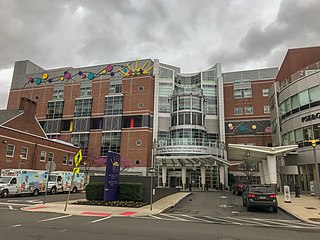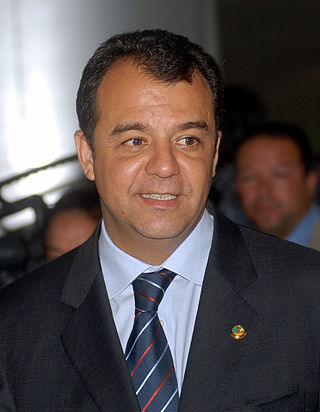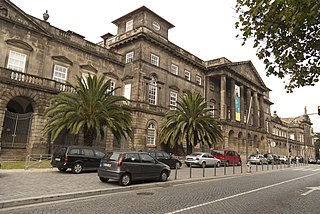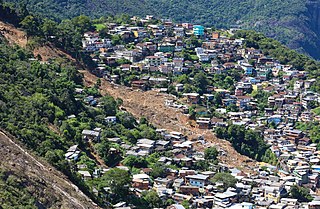
Nova Iguaçu is a municipality in Rio de Janeiro state in Brazil.

The Royal North Shore Hospital (RNSH) is a major public teaching hospital in Sydney, Australia, located in the suburb of St Leonards. It serves as a teaching hospital for Sydney Medical School at the University of Sydney, University of Technology Sydney and Australian Catholic University and has over 600 beds.
A public hospital, or government hospital, is a hospital which is government owned and is fully funded by the government and operates solely off the money that is collected from taxpayers to fund healthcare initiatives. In almost all the developed countries but the United States of America, and in most of the developing countries, this type of hospital provides medical care free of charge to patients, covering expenses and wages by government reimbursement.

The Bristol-Myers Squibb Children's Hospital at Robert Wood Johnson University Hospital (BMSCH) is a freestanding, 105-bed pediatric acute care children's hospital adjacent to RWJUH. It is affiliated with both Robert Wood Johnson Medical School and the neighboring PSE&G Children's Specialized Hospital, and is one of three children's hospitals in the RWJBarnabas Health network. The hospital provides comprehensive pediatric specialties and subspecialties to infants, children, teens, and young adults aged 0–21 throughout New Jersey and features an ACS verified level II pediatric trauma center. Its regional pediatric intensive-care unit and neonatal intensive care units serve the Central New Jersey region.

Adventist HealthCare Shady Grove Medical Center is a 266-licensed bed acute care facility located in Rockville, Maryland. Shady Grove Medical Center provides a range of health services to the community such as high-risk obstetrical care, cardiac and vascular care, oncology services, orthopedic care, surgical services and pediatric care. Opened in 1979 as Shady Grove Adventist Hospital, Shady Grove Medical Center operates as part of Adventist HealthCare, a health-care delivery system that includes hospitals, home health agencies and other health-care services. Adventist HealthCare is headquartered in Gaithersburg, Maryland.

Sérgio de Oliveira Cabral Santos Filho is a Brazilian politician and a journalist

Realengo is a neighborhood in the West Zone of Rio de Janeiro, Brazil. The lower and middle-class neighborhood is between the Mendanha and Pedra Branca mountains. It is located between the mountains of Pedra Branca and Mendanha in the northern of the called West Zone of the city, owned and named the XXXIII Administrative Region which encompasses the entire east around the neighborhood. Realengo usually has the highest temperatures in the city, even though the winter nights are often cold because of the proximity to the mountains. Created on November 20, 1815, every year on this day the city's birthday is celebrated with the Week of Realengo. Pedro I of Brazil and Pedro II of Brazil used to go to the farm of Santa Cruz by the Estrada Real de Santa Cruz, passing by Realengo, where they often stayed.
The Nova Iguaçu Volcano is located in the state of Rio de Janeiro, Brazil, in an area of volcanic rocks at the north-eastern border of the Mendanha massif. Klein and Vieira proposed the site to be an extinct volcano with a volcanic cone, volcanic crater, and volcanic bomb. Scientific journals have studied the volcanic geology of the area, identifying the rocks of volcanic appearance as constituted of subvolcanic intrusive rock bodies. The Nova Iguaçu volcano theory is now extinct in academic communities, but the myth continues in sightseeing promotion groups.
Healthcare in Brazil is a constitutional right. It is provided by both private and government institutions. The Health Minister administers national health policy. Primary healthcare remains the responsibility of the federal government, elements of which are overseen by individual states. Public healthcare is provided to all Brazilian permanent residents and foreigners in Brazilian territory through the National Healthcare System, known as the Unified Health System. The SUS is universal and free for everyone.

A hospital is a healthcare institution providing patient treatment with specialized health science and auxiliary healthcare staff and medical equipment. The best-known type of hospital is the general hospital, which typically has an emergency department to treat urgent health problems ranging from fire and accident victims to a sudden illness. A district hospital typically is the major health care facility in its region, with many beds for intensive care and additional beds for patients who need long-term care.
ChristianaCare is a network of private, non-profit hospitals providing health care services to all of the U.S. state of Delaware and portions of seven counties bordering the state in Pennsylvania, Maryland and New Jersey. The system includes two hospitals in Delaware, Wilmington Hospital and Christiana Hospital, and one in Maryland, ChristianaCare Union Hospital in Elkton. ChristianaCare operates the Helen F. Graham Cancer Center & Research Institute, the Center for Heart & Vascular Health, The Center for Women & Children's Health, and ChristianaCare HomeHealth, as well as the Eugene du Pont Preventive Medicine & Rehabilitation Center, and a wide range of outpatient and satellite services. ChristianaCare is headquartered in Wilmington, Delaware.

Healthcare in Portugal is provided through three coexisting systems: the National Health Service, special social health insurance schemes for certain professions and voluntary private health insurance. The SNS provides universal coverage, although in 2012 measures were implemented to ensure the sustainability of the service by the introduction of user fees to be paid for at the end of treatments. In addition, about 25% of the population is covered by the health subsystems, 10% by private insurance schemes and another 7% by mutual funds. The Ministry of Health is responsible for developing health policy as well as managing the SNS. The Health Regulatory Entity (ERS) is the public independent entity responsible for the regulation of the activity of all the public, private and social healthcare providers. In 2019 the government proposes to scrap all fees, which constitute about 2 percent of the NHS's budget, apart from some hospital emergencies.
Nebraska Medicine, is a private not-for-profit American healthcare company based in Omaha, Nebraska. The company was created as Nebraska Health System (NHS) in 1997, when Bishop Clarkson Hospital merged with the adjacent University Hospital in midtown Omaha. Renamed The Nebraska Medical Center in 2003, in 2014 the company merged with UNMC Physicians and Bellevue Medical Center to become Nebraska Medicine. The company has full ownership of two hospitals and 39 specialty and primary care clinics in and around Omaha, with partial ownership in two rural hospitals and a specialty hospital. Nebraska Medicine's main campus, Nebraska Medicine – Nebraska Medical Center, has 718 beds, while its Bellevue Medical Center campus has 91 beds.

Maria Rosa Canelas, better known as Rosinha de Valença, was a Brazilian composer, arranger and musician. She is considered one of the best acoustic guitarists in Brazilian music and played with many famous artists, including Baden Powell, Sérgio Mendes, Sylvia Telles and Sivuca.
Brazil Child Health is a Brazilian nonprofit organization that works to break the cycle of hospital readmissions of critically ill children from low-income backgrounds. It recognizes that illnesses are not simply matters of biology but are rooted in socioeconomic factors that aggravate and perpetuate the disease. To go beyond medical treatment and to secure patient health for the long term, Associação Saúde Criança espouses a biopsychosocial model of healthcare that provides comprehensive post-hospitalization care and aims to bring the family out of poverty. It has an office based in New York City under the name Brazil Child Health that is a 501(c)(3) non-profit and coordinates international fundraising for the organization.

A long series of criminal investigations have occurred in Brazil associated with Operation Car Wash, since the first one began in March 2014. These investigations are considered offshoots of the original phased investigations.

The Children's Hospital at Montefiore (CHAM) is a nationally ranked pediatric acute care children's teaching hospital located in the Bronx, New York. The hospital has 193 pediatric beds and is affiliated with the Albert Einstein College of Medicine. The hospital is a member of the Montefiore health network and is the only children's hospital in the network. The hospital provides comprehensive pediatric specialties and subspecialties to infants, children, teens, and young adults aged 0–21 throughout the Bronx and New York state. Children's Hospital at Montefiore also sometimes treats adults that require pediatric care. While CHAM does have a pediatric emergency department, they do not have a pediatric trauma center and sends all pediatric trauma cases to the nearby Jacobi Medical Center's level II pediatric trauma center. The Children's Hospital at Montefiore is one of the largest providers of pediatric health services in New York state. The hospital is attached to Montefiore Medical Center and is affiliated with the Ronald McDonald House of New York.

The Mackenzie Evangelical University Hospital is the Mackenzie Evangelical College of Paraná's university hospital, located in Curitiba, State of Paraná, Brazil. It is the largest private medical center in that Brazilian state, with 475 beds and 4 facilities, besides being the developer and owner of the first multi-tissue bank of Brazil. The hospital handles approximately 1.1 million outpatient visits each year, 90% of which are covered by Brazil's public healthcare system, SUS.

On 15 February 2022, intense rainfall in Petrópolis, Rio de Janeiro, Brazil caused mudslides and flooding that destroyed parts of the city. At least 231 people died in the disaster.













